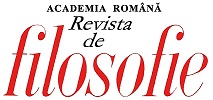Semnificația 'Opusului postum' pentru filosofia transcendentală
The Meaning of 'Opus Postumum' for Transcendental Philosophy
Author(s): Rodica CroitoruSubject(s): History of Philosophy, German Idealism
Published by: Editura Academiei Române
Keywords: transcendental philosophy; metaphysics; physics; experience; action;
Summary/Abstract: To find out the meaning of the Opus Postumum for transcendental philosophy, whose task is to conclude it, it is necessary to pay attention to its relation to the Critique of Pure Reason, which sets the tasks and the working method of this type of philosophy. Its tasks are connected to knowledge and are satisfied by the faculties the human subject disposes of; faculties which defines the knowledge as a phenomenology of the creative subject, of its concepts and principles. They must reach higher and higher, until metaphysics, whose objects are God, the immortal soul and freedom. On these ones Kant hoped to reach certainty. Or, the Critique of Pure Reason proved to be an impossible task; and, therefore, for metaphysics, they are representing a limit. But since the answer to these questions is of importance, Kant directed his investigations to the human action, respectively, to the field of morals. It can answer for the way the human action is to be thought, if the will is free, if there is a God and a future world. The way in which the Opus Postumum has completed the metaphysical task follows the opposite path of the Critique of Pure Reason. It starts with the general principles of the metaphysics of nature, and ends with physics, which intends to include the whole of corporeal things in a system of the laws of experience. Kant could achieve this plan, due to his innovative position on physics, but, at the same time, to the flexibility of his concept of transcendental philosophy. Together with the integration of physics in his system, the metaphysical message of the Critique of Pure Reason decreased in importance, because the metaphysics, from the purpose of knowledge, became only a branch of transcendental philosophy, put in its service. With its assistance, transcendental philosophy becomes the discipline constituted as an absolute unity, in progress to the unity of experience. The three transcendental ideas of the Critique used to be reduced to two ideas, which are God and the world. By invoking the world, the Opus Postumum is offering more possibilities to human action and, at the same time, succeeded to put together the investigation of nature with human action, such as to satisfy the purpose of transcendental philosophy.
Journal: Revista de filosofie
- Issue Year: LXIX/2022
- Issue No: 4
- Page Range: 455-464
- Page Count: 10
- Language: Romanian

